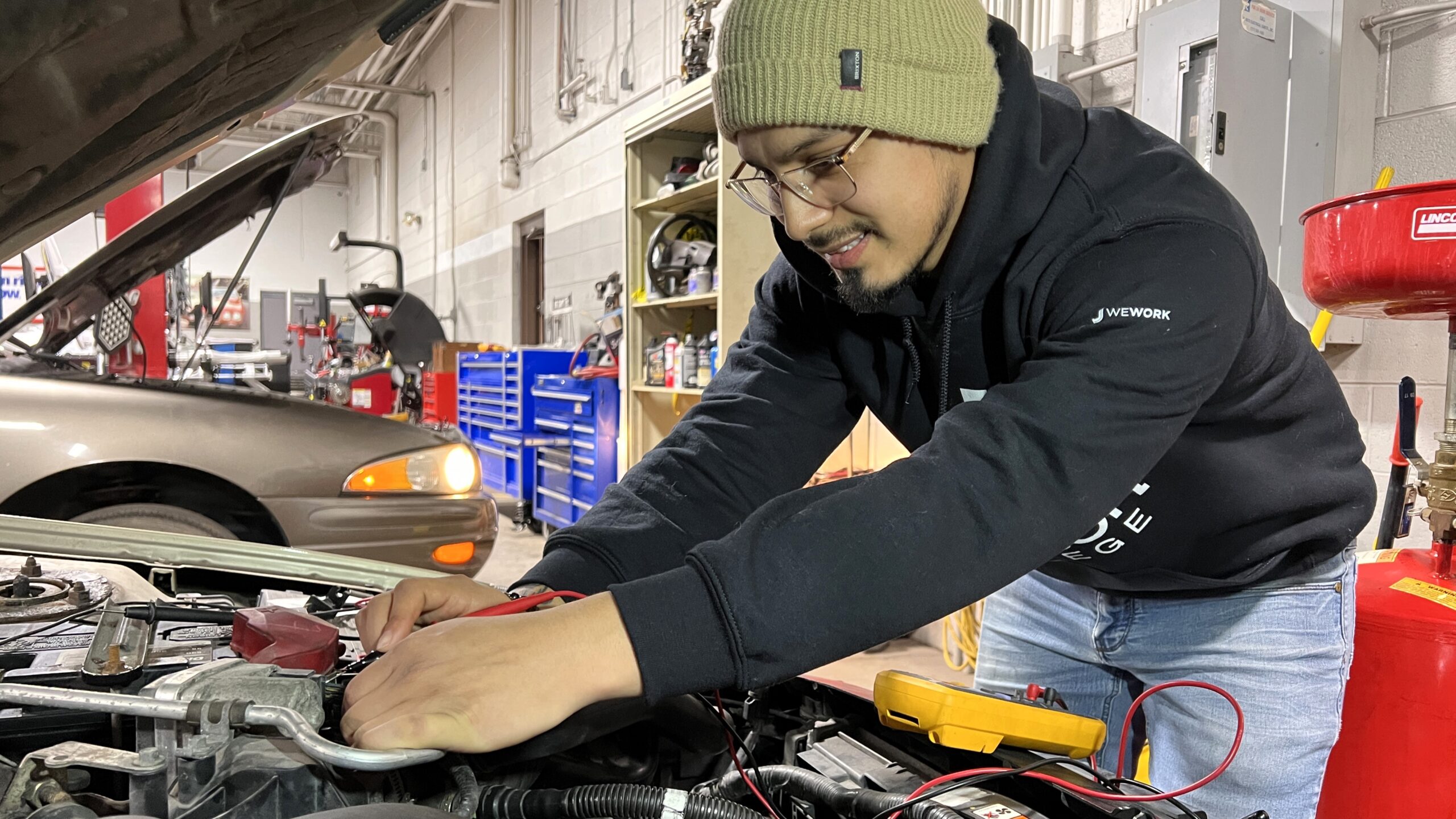Automotive Technology
Program Overview

The two-year Automotive Technology Associates Degree program prepares students as entry-level technicians in the automobile and diesel industries.
Senior Testing Fees
In addition to tuition, Automotive Technology Students will have fees associated with their major reflected yearly per the Enrollment Agreement. These fees cover State and Federal Licensing Requirements. These are all mandatory to complete the program. State inspection fees can be waived for those students who have achieved this credential and/or out-of-state students not needing such a credential.
Watch the video below to learn why Automotive Technology might be right for you.
Johnson College’s President & CEO, Dr. Katie Pittelli, visits industry partner, TASCA FORD.
Career Opportunities
Graduates can work for employers in the automotive career fields of automotive, truck, farm and earthmoving equipment dealerships; truck, power generation and construction companies; automotive service centers; engine repair/machine shops; automotive equipment distributors; independent service garages; automotive parts manufacturers; sales representation; and auto insurance companies. Graduates may work with brake systems, transmissions, alignments and repairs; be representatives in claim, sales and service, or become truck/fleet maintenance technicians.
Our Automotive Technology program graduates enter the region’s workforce at locations such as Gibbons Ford in Dickson City, PA, Pompey Automotive Group in Scranton, PA & Tunkhannock, PA, and Toyota of Scranton in Scranton, PA.
Program Learning Goals
Goal 1: Graduates will possess the appropriate skills needed for entering the Automotive Technology field.
Student Learning Outcomes – Students will:
- Identify tools necessary to perform job duties
- Demonstrate ability to perform basic automobile services
- Practice Safe work habits for all jobs performed
Goal 2: Graduates will understand the importance of professional behavior, as well as comply with the daily changes within the Automotive Industry and will meet the challenges of continued growth within the Automotive Technology Profession.
Student Learning Outcomes – Students will:
- Interpret basic repair instructions
- Follow diagnostic flow charts to properly diagnose problems
- Take basic skills to the next level with on the job training
Goal 3: Graduates will be provided the skills that will allow them to choose careers in the field.
Student Learning Outcomes – Students:
- Can become electrical systems specialists
- Will be able to recognize importance of customer satisfaction
- Can use their automotive knowledge to become Parts Specialists
Course Outline
2025-2026 Program Sequence
| Term 1 (Fall) | Credits: 14 | |
| AUT-151 | Introduction to Vehicle Maintenance & Repair Technology | 2 |
| AUT-153 | Brake Systems | 1 |
| AUT-154 | Brake Systems Lab | 2 |
| AUT-155 | Steering and Suspension Systems | 1 |
| AUT-156 | Steering and Suspension Systems Lab | 2 |
| AUT-157 | Introduction to Welding for Automotive Students | 2 |
| CPT-101 | Microcomputers I | 3 |
| SSS-101 | First Year Experience | 1 |
| Term 2 (Spring) | Credits: 18 | |
| AUT-159 | Electrical and Electronic Systems | 1 |
| AUT-160 | Electrical and Electronic Systems Lab | 2 |
| AUT-161 | Engine Performance and Emissions | 1 |
| AUT-162 | Engine Performance and Emissions Lab | 2 |
| AUT-163 | Internal Combustion Engine Fundamentals | 1 |
| AUT-164 | Internal Combustion Engine Fundamentals | 2 |
| BUS-101 | Introduction to Business | 3 |
| COM Elective | Communications Elective | 3 |
| MAT Elective | Mathematics Elective | 3 |
| Term 3 (Fall) | Credits: 16 | |
| ART Elective | Art Elective | 3 |
| AUT-261 | Gasoline Engine Overhaul Procedures | 2 |
| AUT-262 | Gasoline Engine Overhaul Procedures Lab | 2 |
| AUT-263 | Advanced Automotive Electrical Technology | 1 |
| AUT-264 | Advanced Automotive Electrical Technology | 2 |
| AUT-265 | Automotive Transmissions and Transaxles | 1 |
| AUT-266 | Automotive Transmissions and Transaxles Lab | 2 |
| HUM Elective | Humanities Elective | 3 |
| Term 4 (Spring) | Credits: 17 | |
| AUT-253 | Certifications for Automotive Students | 2 |
| AUT-267 | Manual Transmissions and Differentials | 1 |
| AUT-268 | Manual Transmissions and Differentials Lab | 2 |
| AUT-269/270 | Applied Automotive Principles and Applications | 4 |
| OR INT-299D | OR Internship | |
| DAS-201 | Driver Assistance Systems | 2 |
| VMR-251 | HVAC Vehicle Systems | 2 |
| VMR-252 | HVAC Vehicle Systems Lab | 1 |
| SCI Elective | Science Elective | 3 |
| AUT Program Total | 65 |
This term layout is based off of a fall start. Students who start in the spring will be required to attend an additional term to complete their degree.
There may be special admission requirements for this program. Please speak with a Recruitment Advisor by calling 570-702-8856 or email enroll@johnson.edu to review our requirements.
For course descriptions, please visit the Course Catalog.


